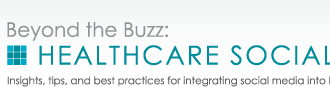By Fanny Gillet and edited by Colleen Young

Nicole Ghanie-Opondo
By Fanny Gillet and edited by Colleen Young
On Wednesday May 1st, Nicole Ghanie-Opondo (@todayisbanana) moderated our tweetchat and asked the community how social media can serve behaviour change messages and help track diseases. As an introduction to the discussion she wrote an article in her blog – Behaviour Change, Disease Tracking & Social Media?
T1: People have tuned out of some behaviour messaging – can SM help?
Generally speaking, when it comes to behavior changes there is no miracle and most hcsmca-ers agreed that social media can’t be “the solution”. However, according to some chat participants, social media can provide useful peer support. By sharing real stories people may feel less alone and be influenced by the positive behaviour changes of others in their networks – “if you/they can do it, so can I”.
T1: SM can help folks empower themselves to change behaviours, especially when they meet others going through the same thing. #hcsmca
— Samuel Dunsiger (@samdunsiger) 1 mai 2013
Social media can also be a good tool to provide a message with a different approach, a more personal language and to get feedback from the audience.
@todayisbananas We need to use social media to provide information in a “real person” not professional way. Make it personal #hcsmca ^aw
— HaltonParents (@haltonparents) 1 mai 2013
Hcsmca-ers also noticed that social media can have a negative impact simply because they can transmit the wrong message to an audience.
@todayisbananas @samdunsiger. T1 SM is an agnostic tool and so can be just as powerful in reinforcing negative behaviors #hcsmca
— Pat Rich (@cmaer) 1 mai 2013
The opposite is also true because social media can be used to refute these wrong information through the sharing of studies for example.
@cartooninperson As community manager I’ve often used SM to correct info & slow rumours on things like ‘super STIs’ #hcsmca
— Nicole Ghanie-Opondo (@TodayisBananas) 1 mai 2013
The members debated about the length of the messages on social media and they notably said that short messages can be perceived as bossy. However, for others these messages are less pushy than longer ones.
@todayisbananas Yes, definitely. It’s hard to get message across in 140 char without sounding bossy sometimes! #hcsmca ^aw
— HaltonParents (@haltonparents) 1 mai 2013
@alainabcyr Bite sized chunks definitely more effective. Can’t expect SM to chg macro behaviour overnight #hcsmca
— Colin Hung (@Colin_Hung) 1 mai 2013
Social media can also be used to find out why people tune out behaviour change messaging and thus be a tool to bring them on board.
@todayisbananas T1 Tuning out doesn’t mean msg needs to be louder. Unhealthy behaviour comes from social issue. SM can identify. #hcsmca
— Ashley Ashbee (@cartooninperson) 1 mai 2013
T2: Should public health be using social media for disease tracking, beyond the flu?
Some hcsmca-ers are skeptical; they doubt about the accuracy of the data.
Agreed, that is my concern ^aw RT @cihrcafe_hfx: T2: One worry might be how accurate we can expect data from SM to be. #hcsmca
— HaltonParents (@haltonparents) 1 mai 2013
They notably questioned the meaning “likes” and “RTs” on social media – Do they reflect people’s thoughts? Do people always read what they like?
@todayisbananas @colin_hung I never assume people read when they Like/RT. What if they just want visibility? What if they’re bots? #hcsmca
— Ashley Ashbee (@cartooninperson) 1 mai 2013
Members also added that even if the data are not perfectly representative, they can still give some information that shows useful patterns.
+1 RT @alextyml: re: T2… I think there is value because the info is there. SM makes everything public!#hcsmca
— Nicole Ghanie-Opondo (@TodayisBananas) 1 mai 2013
@farrahschwartz T2: Good point, especially, I think, stories like where access is lacking for certain issues. 1 story enough. #hcsmca
— Ashley Ashbee (@cartooninperson) 1 mai 2013
During the discussion, hcsmca-ers shared interesting links that I gathered here:
- Pharmville: Applying Gamification to Healthcare
- Helene Campbell launches campaign to support transplant recipients
- Adventures in Sex City – The Health Unit
- Trending Now: Using Social Media to Predict and Track Disease Outbreaks
- Flu Evolution in Canada
- Health Map
For more details about the chat, you can read the full transcript.
What type of media do you think is the most successful in positive and healthy behaviour change and why?
image: HCSM/shutterstock






